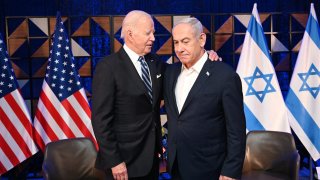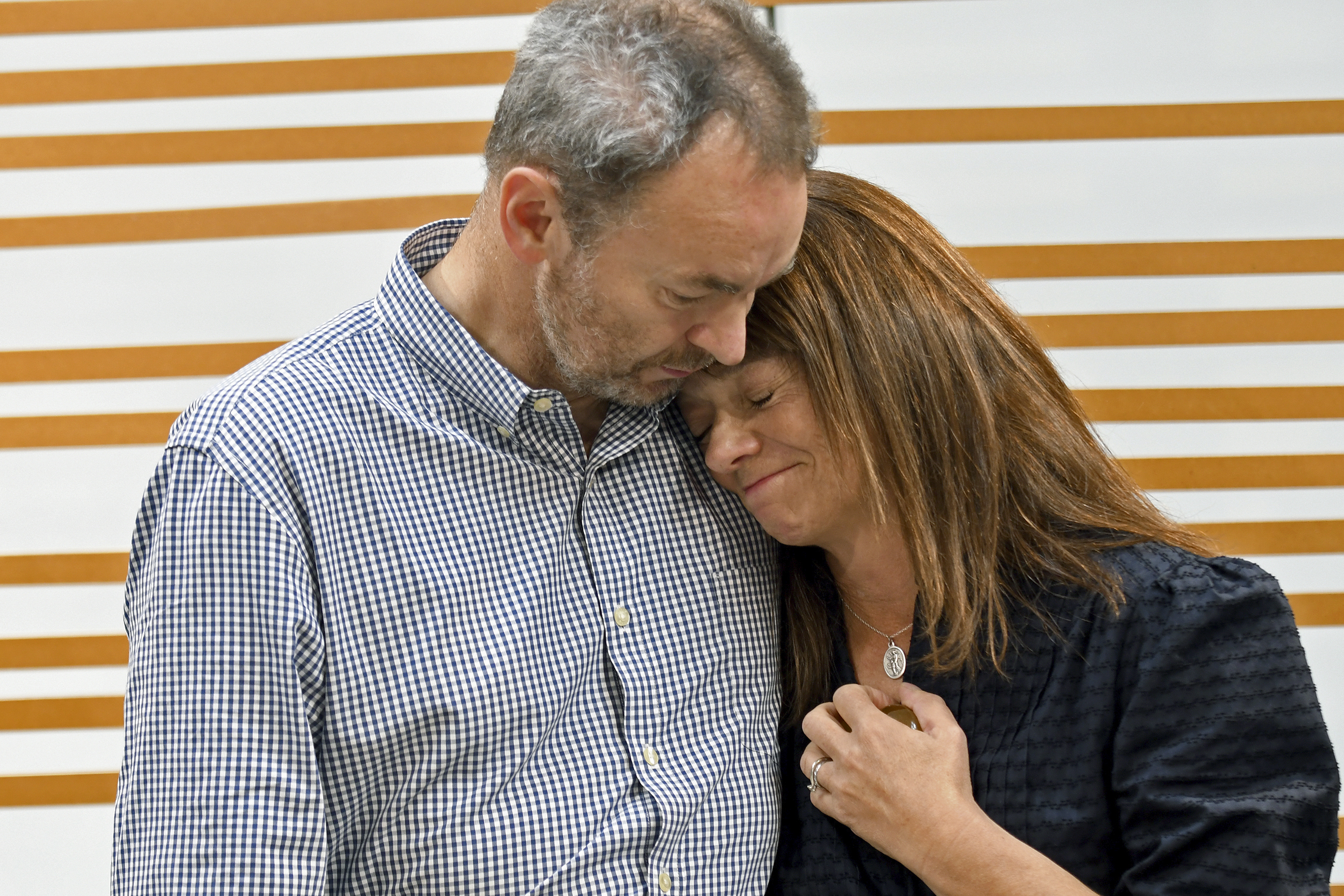
Israeli Prime Minister Benjamin Netanyahu said Saturday that he “will not compromise on full Israeli control” over Gaza and that “this is contrary to a Palestinian state,” rejecting U.S. President Joe Biden’s suggestion that creative solutions could bridge wide gaps between the leaders' views on Palestinian statehood.
In a sign of the pressures Netanyahu’s government faces at home, thousands of Israelis protested in Tel Aviv calling for new elections, and others demonstrated outside the prime minister’s house, joining families of the more than 100 remaining hostages held by Hamas and other militants. They fear that Israel's military activity further endangers hostages' lives.
Netanyahu is also under heat to appease members of his right-wing ruling coalition by intensifying the war against Hamas, which governs Gaza, while contending with calls for restraint from the United States, its closest ally.
Netanyahu posted his statement on social media a day after his first conversation with Biden in nearly a month. Discussing his administration's position Friday, Biden said “there are a number of types of two-state solutions" and, asked if a two-state solution was impossible with Netanyahu in office, Biden replied, “No, it’s not.”
Get Boston local news, weather forecasts, lifestyle and entertainment stories to your inbox. Sign up for NBC Boston’s newsletters.
After Netanyahu's statement, a spokesman for Palestinian President Mahmoud Abbas called for the United States to go further. "It is time for the United States to recognize the state of Palestine, not just talk about a two-state solution,” Nabil Abu Rudeineh said in a statement.
U.N. Secretary-General Antonio Guterres said “the refusal to accept the two-state solution for Israelis and Palestinians, and the denial of the right to statehood for the Palestinian people, are unacceptable.” Speaking in Uganda, he said the refusal would “indefinitely prolong” the conflict.
U.S. & World
Netanyahu has said Israel must fight until it achieves “complete victory” and Hamas no longer poses a threat but has not outlined how this will be accomplished.
But a member of Israel’s War Cabinet, former Israeli army chief Gadi Eisenkot, has called a cease-fire the only way to secure the hostages' release, a comment that implied criticism of Israel's current strategy.
Critics have accused Netanyahu of preventing a Cabinet-level debate about a post-war scenario for Gaza. They say he is stalling to prevent conflict within his coalition. Netanyahu's office called the claim that he was unnecessarily prolonging the war “utter nonsense.”
Israel launched its war against Hamas after the militant group's unprecedented Oct. 7 attack that killed about 1,200 people, mostly civilians, in Israel and saw about 250 others taken hostage. Health authorities in Hamas-ruled Gaza say Israel's offensive has killed nearly 25,000 Palestinians, most of them women and children.
The offensive, one of the most destructive military campaigns in recent history, has pulverized much of the territory and displaced more than 80% of its population of 2.3 million people. An Israeli blockade that allows only a trickle of aid into Gaza has led to widespread hunger and outbreaks of disease, United Nations officials have said.
Netanyahu has insisted that the only way to secure the hostages’ return is by crushing Hamas through military means. More than 100 hostages, mostly women and children, were released during a brief November cease-fire in exchange for the release of Palestinian women and minors imprisoned by Israel. Israel has said that more than 130 hostages remain in Gaza, but only about 100 are believed to be alive.
The protest outside Netanyahu's home in the coastal town of Caesarea grew, with police pushing a few attendees away, sparking arguments.
“We can’t take it anymore. We’ve been told to sit quiet, let the government do its job. Well, it’s not bringing us any result for the last two months,” said Yuval Bar On, whose father-in-law, Keith Siegel, is among the hostages.
The protest began Friday when the father of a 28-year-old held by Hamas began what he called a hunger strike. Eli Shtivi pledged to eat only a quarter of a pita a day — the amount some hostages reportedly receive some days — until the prime minister agrees to meet with him.
At the Tel Aviv protest, former hostage Chen Goldstein-Almog told the crowd that “if we, as a society, as a state, don’t do everything, I mean everything, to return the abductees, the living and the dead, we have no right to exist, as a state and as a society.”
The Israeli military spokesman, Rear Adm. Daniel Hagari, said the military was not carrying out attacks in areas where it knows or assumes there are hostages and the army works “in all possible ways to bring them home.”
Dozens of anti-war protesters also gathered in the Israeli city of Haifa, carrying signs reading “Stop genocide” and scuffling with police who tried to confiscate the placards. Police made one arrest.
As part of its search for the hostages, Israel's military dropped leaflets on Gaza's southernmost town of Rafah. The leaflets, with photos of dozens of hostages, carried a message suggesting benefits for anyone who spoke up.
“You want to return home? Please report if you identified one of them,” the message read.
Hours later, Al-Majd al-Amni, a media outlet linked to the Hamas internal security force, warned Palestinians against supplying any information about Israeli soldiers held hostage in Gaza.
The war has rippled across the Middle East, with Iranian-backed groups attacking U.S. and Israeli targets. Fighting between Israel and Hezbollah militants in Lebanon threatens to erupt into all-out war, and Iran-backed Houthi rebels in Yemen are targeting international shipping in the Red Sea despite U.S.-led airstrikes.
On Saturday, an Israeli strike on Syria's capital destroyed a building used by the Iranian paramilitary Revolutionary Guard, killing at least five Iranians, Syrian and Iranian state media reported. Also Saturday, an Israeli drone strike on a car near the Lebanese port city of Tyre killed two people, the state-run National News Agency reported. It was not immediately clear who the target was.
In Gaza, residents reached by phone after a seven-day communications blackout reported heavy bombardment and fighting between militants and Israeli troops in and around the southern city of Khan Younis and the urban refugee camp of Jabaliya in the north.
The fighting has forced many families to leave their homes, many of which were reduced to rubble, said Halima Abdel-Rahman, a woman displaced from northern Gaza who now shelters in Bani Suheila on the outskirts of Khan Younis.
A car was apparently struck by a drone in Rafah, killing four, according to an Associated Press cameraman at a local morgue. Israel's military didn't immediately comment.
In the Israeli-occupied West Bank, meanwhile, mourners gathered for the funeral of Tawfiq Ajaq, a 17-year-old American Palestinian shot and killed a day earlier near Ramallah. The circumstances of the shooting remained unclear, and police said the incident was under investigation.
___
Bassem Mroue in Beirut, Jon Gambrell in Jerusalem and Najib Jobain in Rafah, Gaza Strip, contributed to this report.



